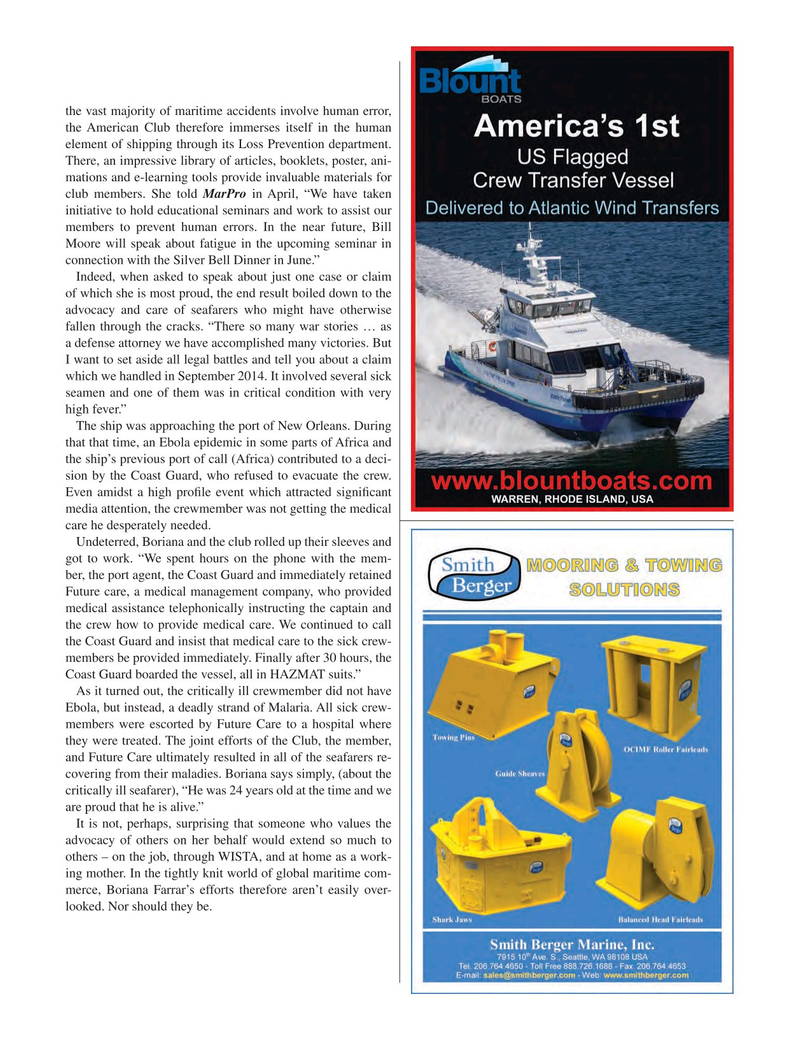
Page 19: of Maritime Logistics Professional Magazine (Q2 2016)
Energy Transport & Support
Read this page in Pdf, Flash or Html5 edition of Q2 2016 Maritime Logistics Professional Magazine
the vast majority of maritime accidents involve human error, the American Club therefore immerses itself in the human element of shipping through its Loss Prevention department.
There, an impressive library of articles, booklets, poster, ani- mations and e-learning tools provide invaluable materials for club members. She told MarPro in April, “We have taken initiative to hold educational seminars and work to assist our members to prevent human errors. In the near future, Bill
Moore will speak about fatigue in the upcoming seminar in connection with the Silver Bell Dinner in June.”
Indeed, when asked to speak about just one case or claim of which she is most proud, the end result boiled down to the advocacy and care of seafarers who might have otherwise fallen through the cracks. “There so many war stories … as a defense attorney we have accomplished many victories. But
I want to set aside all legal battles and tell you about a claim which we handled in September 2014. It involved several sick seamen and one of them was in critical condition with very high fever.”
The ship was approaching the port of New Orleans. During that that time, an Ebola epidemic in some parts of Africa and the ship’s previous port of call (Africa) contributed to a deci- sion by the Coast Guard, who refused to evacuate the crew.
Even amidst a high pro? le event which attracted signi? cant media attention, the crewmember was not getting the medical care he desperately needed.
Undeterred, Boriana and the club rolled up their sleeves and got to work. “We spent hours on the phone with the mem- ber, the port agent, the Coast Guard and immediately retained
Future care, a medical management company, who provided medical assistance telephonically instructing the captain and the crew how to provide medical care. We continued to call the Coast Guard and insist that medical care to the sick crew- members be provided immediately. Finally after 30 hours, the
Coast Guard boarded the vessel, all in HAZMAT suits.”
As it turned out, the critically ill crewmember did not have
Ebola, but instead, a deadly strand of Malaria. All sick crew- members were escorted by Future Care to a hospital where they were treated. The joint efforts of the Club, the member, and Future Care ultimately resulted in all of the seafarers re- covering from their maladies. Boriana says simply, (about the critically ill seafarer), “He was 24 years old at the time and we are proud that he is alive.”
It is not, perhaps, surprising that someone who values the advocacy of others on her behalf would extend so much to others – on the job, through WISTA, and at home as a work- ing mother. In the tightly knit world of global maritime com- merce, Boriana Farrar’s efforts therefore aren’t easily over- looked. Nor should they be.
MN May16 Layout 18-33.indd 19 5/19/2016 11:19:11 AM

 18
18

 20
20
